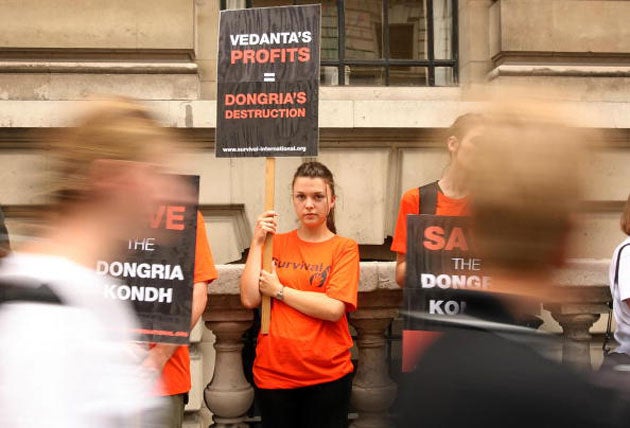Indian tribe loses fight to stop UK firm building mine on sacred land

India's highest court has ignored the pleas of tribal people fighting to protect a sacred mountain by allowing a British company to establish a bauxite mine across a vast swathe of the area.
Despite months of protests by campaigners who say the mine will all but destroy the Niyamgiri Hills, the Supreme Court said Vedanta Resources had met the conditions required to proceed with the project. It ordered, however, that the company must invest a percentage of its profits from the mine to help local people.
The tribal people have vowed to continue their protests and said they would rather die than give up their homes. Jairam, a villager from the Rayagada district, said: "Even if you kill us we will not give Niyamgiri. Our souls are in Niyamgiri. Our food, water, homes are in Niyamgiri. There is nothing without Niyamgiri."
For the Dongria Kondh tribe, the Niyamgiri Hills in the state of Orissa represent not just their home but their deity. They say the mountain gives them everything they need for their survival and that they could not live anywhere else. They have repeatedly argued that they cannot understand why their homes should be taken over by a company that will destroy the mountain, especially by a foreign corporation.
But the plan has the backing of powerful interests and both the federal and state government have given to their support to the project, saying it will help industrialise and exploit the mineral interests of an underdeveloped region.
For campaigners, the battle to save Niyamgiri has become a cause celebre at a time when much international attention focuses on India's economic development. Some believe yesterday's ruling could come to represent a landmark decision in which the interests of those people left outside the bubble of growth were deemed less important.
Bratindi Jena, of the charity Action Aid, said: "When any country is developing or shining in terms of its economy, it does not help the marginalised communities – the tribal people, women, and so forth. They remain outside of the benefits. [This decision] is devastating for the indigenous people living there."
At Vedanta's shareholders' meeting last week in London, the company chairman, Anil Agarwal, said the project would only proceed with the "complete permission" of the courts and the local people.
A Vedanta spokesman, C B Krishnan, said last night: "A public hearing was held and all the local people supported the project. It's all in the public record."
Join our commenting forum
Join thought-provoking conversations, follow other Independent readers and see their replies
Comments